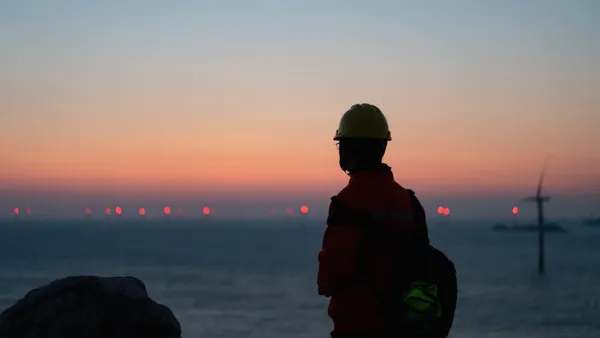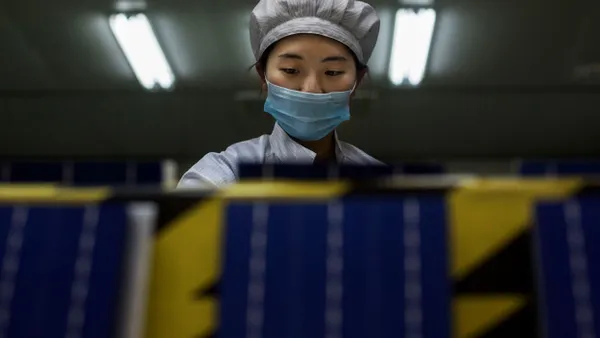Dive Brief:
- The head of the U.S. Office of the Trade Representative requested the U.S. International Trade Commission prepare a supplemental report to help President Donald Trump make a final decision on whether to impose duties on imported solar hardware.
- The request from Ambassador Robert Lighthizer pushes back the deadline for Trump's final decision on import duties from Jan. 12 to Jan. 26. Lighthizer asked the ITC to detail any "unforeseen developments" that led domestic solar manufactures to be injured by cheap imports from other countries.
- The request could mean the administration is trying to forestall potential challenges at the World Trade Organization (WTO) or an attempt to find a reason not to levy tariffs on imported chrystalline silicon photovoltaic solar modules and cells, Clark Packard, a trade analyst at the R Street Institute, told Bloomberg.
Dive Insight:
A final decision from President Donald Trump could be delayed as the U.S. Office of the Trade Representative, the final stop for public hearings over the high-profile solar trade case, requests more information from the ITC.
USTR's request pushes back the date for presidential action from Jan. 12 to Jan. 26. https://t.co/ZF1rBm5ye0
— Isabelle Hoagland (@bellehoagland1) November 29, 2017
In a letter, Ambassador Lighthizer requested the ITC put together a supplemental report that would "assist the President in determining the appropriate and feasible action to take that will facilitate efforts by the domestic industry to make a positive adjustment to import competition and provide greater economic and social benefits than costs."
More significantly, the letter also asked the commission to identify any "unforeseen developments" that led to the high quantities of imported solar modules and cells causing "serious injury" to domestic manufacturers.
In April, U.S.-based solar manufacturer Suniva petitioned the ITC for a Section 201 investigation after filing for bankruptcy protection, blaming Chinese imports. SolarWorld, another U.S.-based manufacturer, later joined after its German parent company filed for insolvency.
In September, the ITC unanimously found cause for injury, setting up a final decision on potential trade duties from President Trump.
Opponents of the petition, such as the Solar Energy Industries Association, said any sort of tariff or quota could hurt 88,000 jobs in the solar sector next year, mostly related to installation and the downstream supply chain. Trade duties could also threaten as much as two-thirds of utility-scale solar projects, which have driven most of the resource's growth in the U.S.
Suniva and SolarWorld have requested a declining tariff that begins at $0.25/watt for solar cells and a floor price of $0.74/watt for solar modules. For solar modules, they want tariffs that start at $0.32/watt and fall to $0.29/watt in four years.
Suniva’s proposal also includes a revised floor price of $0.74/watt for solar modules that drops to $0.64/watt in four years. These proposed duties would be added to tariffs already imposed in 2015 and 2012 on China and Taiwan at the behest of SolarWorld, and be in place for at least four years, with the option of renewing for an additional four-year term.
The commissioners in a separate ruling also found injury from imports from Mexico and South Korea.
After the injury ruling, the commission proposed three separate remedies to send to Trump. The remedies were a mixture of tariffs, quotas and a new licensing fee proposed by SEIA. The highest tariff came in at 35%, which roughly pencils out to a little more than $0.15/watt, according to GTM.
Trump, however, has the option to ignore the ITC's recommendations and compose his own set of tariffs, or choose to take no action.
The imposition of trade duties of any kind would likely set up a challenge at the WTO. A Chinese representative questioned the legality of the ITC's finding in an October hearing. GTM's Shayle Kann told Utility Dive that the vast majority of Section 201 remedies met their end when challenged at the WTO.
If Trump does decide to impose tariffs, it would mark a departure from the economic blueprint laid out by his conservative allies such as the Heritage Foundation. Many of the them, including Heritage, have condemned the Section 201 petition.
However, R Street Institute's Packard notes Lighthizer's request for more information could mean that the administration is trying to avoid controversy by not imposing any tariffs.
"If they are looking for some angle to get out of this — I think this may be their best option,” Packard told Bloomberg.
Proponents and critics of solar import duties could have a chance to weigh in on Lighthizer's request next week. The final hearing at the Office of the Trade Representative is scheduled for Dec. 6.













